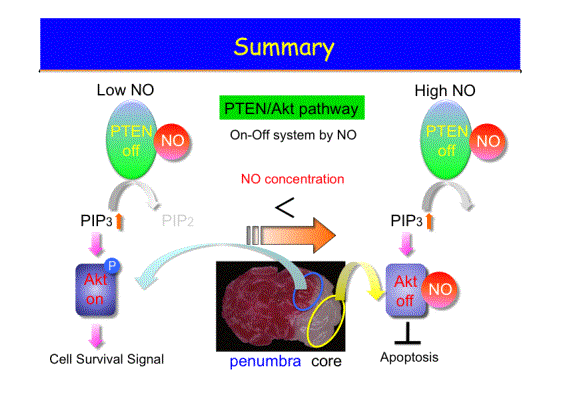Medicinal Pharmacology (Takashi UEHARA)
Medicinal Pharmacology Takashi UEHARA, PhD
Research Focus
The Uehara laboratory focuses on the elucidation of the molecular mechanisms of neurodegenerative diseases, such as Parkinson’s/Alzheimer’s diseases and brain ischemia. Professor Uehara is specifically interested in the regulatory system of signaling pathways that play a central role in the responses triggered by radical or oxidative stress. Among the laboratory’s accomplishments and ongoing activities are (1) the isolation and characterization of S-nitrosylated or oxidized proteins by several screening techniques; (2) investigation of the intracellular signaling in response to oxidative/nitrosative stress; (3) elucidation of the molecular mechanisms of endoplasmic reticulum (ER) stress (Unfolded Protein Response) in neuronal cells/ brain; (4) discovery of substrate proteins to E3 ligases involved in ER-associated degradation (ERAD); and (5) drug discovery based on original results published. These studies are expected to lead to the emergence of new strategies for the development of neuroprotective drugs with pharmacological techniques.

Biography
Takashi Uehara graduated from the Faculty of Pharmaceutical Sciences, Hokkaido University, in 1989, and earned his Ph.D. from the same University in 1995. Thereafter, he joined Professor Nomura’s laboratory (Department of Pharmacology) as an Assistant Professor and was promoted to an Associate Professor in 2000. He joined Dr. Stuart A. Lipton’s laboratory at Burnham Institute for Medical Research from 2002 to 2004 as a senior scientist. In April 2010, Dr. Uehara was invited to join the Graduate School of Medicine, Dentistry and Pharmaceutical Sciences, Okayama University as a full Professor of Medicinal Pharmacology.
Selected Publications
- Tanaka S., Uehara T, and Nomura Y. Up-regulation of protein-disulfide isomerase in response to hypoxia/brain ischemia and its protective effect against apoptotic cell death. J. Biol. Chem. 275:10388-10393.2000.
- Ko HS, Uehara T, Nomura Y. Role of ubiquilin associated with protein-disulfide isomerase in the endoplasmic reticulum in stress-induced apoptotic cell death. J. Biol. Chem. 277(38):35386-35392, 2002.
- Tsuruma K, Nakagawa T, Morimoto N, Minami M, Hara H, Uehara T, Nomura Y. Glucocorticoid modulatory element-binding protein 1 binds to initiator procaspases and inhibits ischemia-induced apoptosis and neuronal injury. J. Biol. Chem. 281:11397- 11404, 2006.
- Uehara T, Nakamura T, Yao D, Shi ZQ, Gu Z, Ma Y, Masliah E, Nomura Y, Lipton SA. S-nitrosylated protein-disulphide isomerase links protein misfolding to neurodegeneration. Nature 441:513-517, 2006.
- Numajiri N, Takasawa K, Nishiya T, Tanaka H, Ohno K, Hayakawa W, Asada M, Matsuda H, Azumi K, Kamata H, Nakamura T, Hara H, Minami M, Lipton SA, Uehara T. On-off system for PI3-kinase-Akt signaling through S-nitrosylation of phosphatase with sequence homology to tensin (PTEN). Proc. Natl. Acad. Sci. USA 108:10349- 10354, 2011.
